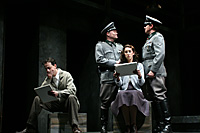At first blush, the idea of a musical about a Nazi-controlled Jewish ghetto sounds like something out of an early draft of Mel Brooks’ The Producers, if not the mind of Franz Kafka.
Terezin, currently in a limited run at the Village Theater’s small First Stage Theater in Issaquah, is neither. It is also not a bad idea.
While the “developmental production” is off-limits to theater reviews, as such, the producers and writers are looking for feedback before they send a final version of the play to New York for an Off-Broadway run. In that spirit, JTNews was invited to see the show during its opening weekend.
The performance features Sarah Davis in the central role of “Hannah,” an artist who is 19 at the start of the play, Kai Daly as her younger brother, “Wolfgang,” Anthony Curry, as her grandfather “Jacob,” and Brian Earp as her love interest, “Simon.” Other principal actors include Ann Evans as “Berta,” Jason Collins as “Kurt” (a hedonistic cabaret singer) and Marc Chenovick doing triple duty as “Jonas,” the Red Cross inspector, and a Russian soldier.
Terezin (or Theresienstadt, as the Germans called it) was a model city for the Jews set up in Czechoslovakia by the Third Reich as a propaganda front for their moves to “resettle” the Jews of the ever-expanding Germany. Representatives of the International Red Cross were brought in to see how well the Nazi government was treating its Jews in their segregated city, and the ruse worked. In fact, the situation of the Jewish inhabitants of Terezin, while anything but happy, was at least better than what awaited them. At the other end of the line were concentration camps such as Auschwitz, where many of the inmate residents eventually wound up.
The city was set up specifically to house artists, writers and intellectuals. For this show, Peter Ullian, who wrote the play has created a half-dozen composite characters. Through them he tells the story of the 60,000 real residents of Terezin and their struggles to survive and let the truth come out about what the Nazis were doing.
The producers interviewed actual survivors of the ghetto in Prague and did extensive research into the story of Terezin, including viewing the Nazi propaganda film, The Establishment, which was produced to spread the false story.
Also represented are the German army officers and SS men who ran the camp until it was liberated by the advancing Russian army in 1945. To its credit, the script does not portray the Nazis in simplistic terms as the resident evil-incarnate of Terezin, but attempts to show a little of the human side of even the villains of the piece.
Producer Virginia Criste, president of Snap-Two Productions, said the inspiration for Terezin came from the story of her grandparents that she heard from her father. Criste (who explains that her maiden name, Spiegel, more clearly indicates her Jewish heritage) visited the village in 1990, before the Czech Republic and Slovakia separated. The only evidence the Nazis had occupied the country was a small exhibit and a collection of artifacts that she was allowed to look at with a museum official standing by.
“Spending a day with the remnants of hand-drawn posters announcing show performances, cabaret tickets, albums of dorm life and so much more was hard to forget,” Criste told the Village Originals’ newsletter, First Stages. That experience stayed with her, leading to her commissioning Ullian, lyricist Len Schiff and composer Joel Derfner to write the musical, which is seeing its first fully staged production right now, under the direction of Jeremy Dobrish.
Criste says all the stories portrayed in the play are based on stories of real people they collected during the research process, although they have fictionalized the events for dramatic effect and to fit it into the format of musical theater.
There are nearly 20 musical numbers in the two-hour-plus production, and the stage allows for several sets to occupy the compact space and span the more than four years over which the play takes place. Criste says one person who has seen it likened Terezin to “a Jewish Les Mis,” referring to the long-running musical adaptation of Victor Hugo’s classic novel, Les Miserables.
Terezin is being offered up as a fully realized production, complete with a live music accompaniment from a five-musician orchestral unit. But Criste says it remains a work-in-progress that the writers and producers are ready to consider changing before shipping the show off for its East Coast premiere.
“I would very much like to have more people see it,” she says. “I’d love to get feedback. We’re remaining open-minded to do one more development.” She says she wants to know how audiences respond to this means of storytelling to communicate the tales of the people who lived and died in Theresienstadt, and the wider lessons for the 21st century.
“I’m interested to see if this communication is working,” Criste says. “This [play] is true and this is what happened to us, but I’m hoping that by doing this and by using the music, to universalize this [story].”
She says she sees a parallel between the Nazis in the play with Arab radicals today who are similarly filled with hatred of Jews, but also wants audiences not to lose sight of the fact that both persecutors and victims are all human.
After the show leaves Issaquah, whether in its current form or after another revision, it will be produced next in Manhattan by the nonprofit Melting Pot Productions, which is a partner in the project with the Village Theater and Snap-Two.
After its New York run, Criste says there are plans to present a concert version of Terezin internationally. She says they have so far made plans for the concert to be performed in Israel, Germany and Hungary.
Ghetto musical a work-in-progress
